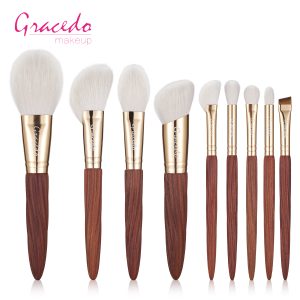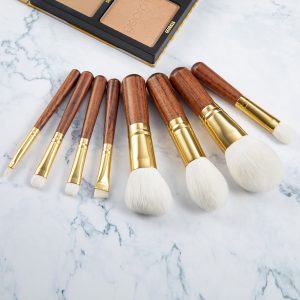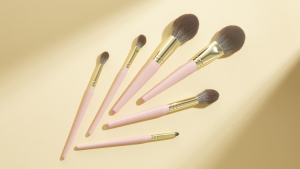Exploring Different Types of Makeup Brush Bristles: A Guide to Choosing the Right Material

Introduction:
Makeup brushes are essential tools in every beauty enthusiast’s collection, but did you know that the type of bristles used can make a significant difference in their performance? In this guide, we delve into the various types of bristle materials commonly found in stores, highlighting their unique characteristics and applications. By understanding these distinctions, you can make informed choices when selecting the perfect makeup brush for your needs.
- Goat Hair:
– Fine Peak: Extremely soft and delicate bristles, rare and expensive.
– Coarse Peak: Versatile grade with longer, finer bristles for loose powder, setting powder, eyeshadow, and blush.
– Fine Long Peak: Similar to Coarse Peak, but with slightly thicker bristles, providing ample volume and color payoff.

- Gray Squirrel Hair:
– Luxuriously soft material suitable for highlighter powder, blush powder, contour powder, and eyeshadow.
– Often combined with goat hair to improve practicality while retaining a pleasant feel.
- Canadian Squirrel Hair:
– Fine bristle tips, excellent bundling, and moderate elasticity.
– Primarily used in high-end eyeshadow brushes due to its scarcity and cost.
- Weasel Hair:
– Excellent elasticity and water resistance, suitable for cream-based products.
– Weasel Tail Hair: Widely used in lip brushes, eyeliner brushes, concealer brushes, and eyeshadow brushes.
– Weasel Body Hair: Ideal for eyeshadow brushes aiming for a natural and translucent finish.
- Horse Hair:
– Average softness and bundling, excels in powder gripping abilities and color reproduction.
– Blended with other materials for enhanced elasticity and durability, commonly used in eyeshadow brushes.
- Kolinsky Sable Hair:
– Thick roots and strong elasticity, perfect for eyebrow brushes.
- Synthetic Fibers:
– Excellent waterproof properties, commonly used in cream, liquid, and foundation brushes.
– Blended with natural bristles for overall stability and shape retention.

Conclusion:
Understanding the characteristics and applications of different makeup brush bristle materials is crucial for achieving desired makeup effects. Whether you’re seeking softness, powder gripping abilities, or elasticity, each material brings unique qualities to the table. By considering these factors, you can make well-informed decisions and select the perfect makeup brush for your makeup routine.